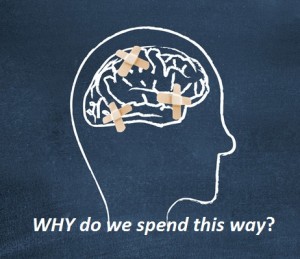This is an interesting item on the topic of nature vs nurture and how they may affect your spending habits. Although the study came out in 2013, it does not appear the information has changed. For those who are curious, read on.
Which affects your spending and borrowing habits more, nature or nurture? Does it matter? Well Dr. Hersh Shefrin, Chair in the Department of Finance at Santa Clara University’s Leavey School of Business seems to think so. In a recent paper for Chase Blueprint’s Resource Center for Mindful Spending, Dr. Shefrin, takes a deeper look into the psychology of why we spend and borrow the way we do.[pullquote_right]…financial education has largely been ineffective in increasing our degree of financial literacy …[/pullquote_right]]
Some would argue it is due to a genetic predisposition, while others would say it is a matter of financial literacy. Well, you would be surprised to find it is actually a little of both. While nature and instincts play a part, a strategic, well-educated thought process (nurture), can override habits and knee-jerk reactions for instant gratification.
According to Dr. Shefrin, Traditional financial education has largely been ineffective in increasing our degree of financial literacy because traditional methods fail to take into consideration the importance of psychology and the knowledge of how our brains make decisions. A recent study showed those with financial literacy training fared no better on tests than those who did not take the class.
Dr. Shefrin suggests the key to better financial literacy would be a two-fold approach. First, identify what motivates us, then design programs aimed at helping develop and maintain strong spending and borrowing patterns. Some ways to do this would be by designing smart, nurturing programs that help people carry out the basics of managing spending and borrowing. Another way would be with the use of modern technology, such as personal financial management tools aimed at providing consumers with their spending data in a straight forward way. Finally, turning finances into fun with the use of games would go a long way to help instill better spending and borrowing habits in children, particularly during the K-12 years.
“There is a high cost to making bad financial decisions,” says Dr. Shefrin. To make real progress, we should harness innovations that can make it possible for people to overcome poor spending and borrowing habits.”

For more information on the role nature and nurture plays in our spending habits, visit: https://www.chase.com/online/chase_blueprint/document/JPMC_Chase_BornToSpend_FINAL.pdf
For more information on the Resource Center for Mindful Spending, visit: https://www.chase.com/online/chase_blueprint/resource-center.htm
